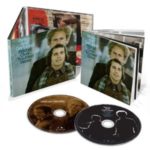
Columbia-Legacy
1970’s Bridge Over Troubled Water is not only the last studio album recorded by the Queens, NY, duo of Paul Simon and Art Garfunkel, it is also their best. It was also their most successful, perching itself atop the number one spot of the Billboard album charts for 10 weeks, while also sweeping the 1971 Grammy Awards, taking home four honors that year, including Album, Record and Song of the Year.
The universal accolades were entirely well deserved. Bridge saw the Forest Hills pair continuing to expand upon the whole two-guys-and-an-acoustic-guitar trip they began to distance themselves from on 1968’s Bookends, weaving in such embellishments as string sections, reggae riddims, funky percussion, Spanish boleros and explosive Stax soul overtones. It’s a record counterbalanced by both their simplest song, the call-and-response “Cecilia”—using only vocals, handclaps and knee slaps to flesh out the spirit of a lover’s plea for forgiveness through the canyon of a crowded Queens neighborhood—and their most complex in “The Boxer,” a song Garfunkel called “a magnificent labor of love” that took over 100 hours to complete and utilized every ounce of the talent employed by the twosome’s longtime engineer Roy Halee and members of the legendary Hollywood studio ensemble The Wrecking Crew. But at the very heart of this most special LP is the earth-shatteringly emotional title cut, a sweeping orchestral ballad about the importance of friendship written by two men whose lifelong bond was crumbling before the listening audience’s very eyes while, at the same time, serving as a touching sonic salve meant to heal a deeply divided nation wounded by war, assassination and broken dreams.
The 40th anniversary edition of Bridge Over Troubled Water boasts a bonus DVD that contains an excellent documentary on the making of the album featuring commentary by all of its participants, as well as the official release of Simon and Garfunkel’s controversial 1969 CBS television special Songs of America. Originally aired uncut only once on the Sunday of that year’s Thanksgiving weekend thanks to sponsor Alberto VO5, who stepped in for Bell Atlantic after they pulled out in an incredible gesture of political cowardice, the hour-long broadcast was meant to convey the angst of the younger generation to their parents and grandparents by interweaving footage of them in the studio and onstage with indelible newsreel footage of Vietnam, Woodstock, the murders of JFK, MLK and RFK and such historic instances of activism as the Delano Grape Strike and the Poor People’s March.
It would have been nice if this edition of Bridge contained the bonus tracks featured on earlier versions of the album, namely the hotly sought-after studio outtake “Cuba Si, Nixon No.” But either way, this magnificent package is a great way to celebrate the release of this most essential masterpiece of American pop.



No Comments comments associated with this post